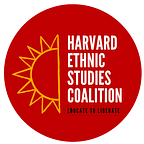Our Response to Harvard’s Ethnic Studies Hiring Freeze
A little over three weeks ago, Harvard publicly proclaimed that it was suspending its search for “faculty specializing in ethnic studies” as part of a University-wide hiring freeze; their immediate and proclaimed reason for doing so — COVID-19 and the shocks it has wrought across many, if not all, global institutions — seemed reasonable, and perhaps unfortunately necessary.
However, only a few days afterwards, Harvard informed the public that it would continue its search for an Athletics Director, to be hired by the end of the academic year. The Athletics Director has now been hired.
We are not surprised; but we are incredibly disappointed and angered by Harvard’s hypocrisy. Administrative and financial decisions concretize Harvard’s prioritization of certain forms of knowledge, certain activities, and certain students over others; namely, that of athletics over critical Ethnic Studies and the anti-colonial scholarship and teaching such a department might produce for the world.
Yes, we are in unprecedented times: due to the financial shocks of coronavirus, the Faculty of Arts and Sciences has netted $30 million in losses due to the “de-densification” of campus. As a result, Dean of the FAS Claudine Gay outlined four principles for Harvard’s financial and administrative decision-making during the global pandemic: “prioritizing health and safety, protecting the ‘academic enterprise,’ leveraging breadth and diversity, and preserving access and affordability.” Whether it has completely sought to fulfill these principles, however, is another question.
Indeed, it doesn’t take much to notice that Harvard’s decisions very clearly indicate its unspoken priorities: namely, its commitment to those programs, initiatives, and activities that preserve capital in the long-term. These are actions ranging from the continuation of the hiring search for an athletic director; to the absence of provision of personal protective equipment (PPE), hazard pay, and non-insolvent sick leave for custodial and dining hall workers; to the commitment of the university to continuing classes in the fall of 2020, despite the many student requests for greater sensitivity to our global situation, and to the situations of students who might not be able to perform at a level that a Harvard education necessitates during this time.
This is to say: when we think about the search for faculty specializing in Ethnic Studies scholarship, we must consider what decisions are being made in the same context; and we cannot see this as an isolated phenomenon.
For example, significant reason for the continuation of the search for an athletic director was that the “hiring freeze will not impact a ‘small number’ of searches that were well underway by the time of the outbreak — including the selection of the next Athletics Director.” The search for an athletic director began in November of 2019, but the search for ethnic studies faculty began in June of 2019. Should that search not qualify as “well underway by the time of the outbreak” is at the discretion of Harvard’s administration.
Even from a practical standpoint, the university has made very clear that even if classes continue in some physical or normal capacity, social distancing will remain a reality, which begs the question — why is the search for an athletics director so important? It is highly unlikely that athletics events will even exist in any substantial capacity this upcoming academic year.
The hiring freeze further signals Harvard’s active investment in producing Ethnic Studies work as non-essential. Specifically, as Professor Lorgia García-Peña makes evidently clear in this article, “our work, our people, our students, are chewed up and spat out if we are not subtle enough, if we upset the belly, if our work becomes too essential.”
Harvard is a ruthless, monstrous institution that will do everything in its power to keep its capitalistic, settler-colonial interests at the forefront of their efforts. That means an indefinite hiring freeze. That means firing the only Latinx Studies professor at the College. That means diminishing students’ possibilities of graduating within the Latinx Studies track both at the undergraduate and graduate level. That means refusing to divest from the prison-industrial complex, occupied Palestine, and the fossil fuel industry. That means denying financial and legal support to workers fighting to extend their Temporary Protected Status (TPS).
Again, Harvard’s decision to suspend its faculty search is only one instance of Harvard’s demonstrated history of a hesitant and ultimately non-existent commitment to Ethnic Studies, both long-term and in the recent past. This includes the previously enumerated loss of four scholars of Ethnic Studies — Professor Genevieve Clutario, Professor Natasha Warikoo, Professor Ahmed Ragab, and, most recently, Professor Lorgia García-Peña — who were on the frontlines of the fight to carve out a space for Ethnic Studies at Harvard.
